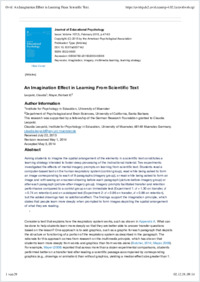An Imagination Effect in Learning From Scientific Text
- Leopold, Claudia Universität Münster
- Mayer, Richard E. Universität California
-
2015
Published in:
- Journal of Educational Psychology. - 2015, vol. 107, no. 1, p. 47-63
English
Asking students to imagine the spatial arrangement of the elements in a scientific text constitutes a learning strategy intended to foster deep processing of the instructional material. Two experiments investigated the effects of mental imagery prompts on learning from scientific text. Students read a computer-based text on the human respiratory system (control group), read while being asked to form an image corresponding to each of 9 paragraphs (imagery group), or read while being asked to form an image and with seeing an onscreen drawing before each paragraph (picture- before-imagery group) or after each paragraph (picture-after-imagery group). Imagery prompts facilitated transfer and retention performance compared to a control group on an immediate test (Experiment 1: d = 1.30 on transfer, d = 0.74 on retention) and on a delayed test (Experiment 2: d = 0.86 on transfer, d = 0.98 on retention), but the added drawings had no additional effect. The findings support the imagination principle, which states that people learn more deeply when prompted to form images depicting the spatial arrangement of what they are reading.
- Faculty
- Faculté des lettres et des sciences humaines
- Department
- Département des sciences de l'éducation et de la formation
- Language
-
- English
- Classification
- Education, teaching
- License
-
License undefined
- Identifiers
-
- RERO DOC 327798
- DOI 10.1037/a0037142
- Persistent URL
- https://folia.unifr.ch/unifr/documents/308437
Statistics
Document views: 134
File downloads:
- Texte intégral: 636
